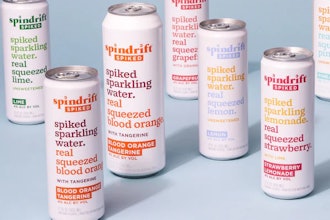WASHINGTON, July 1, 2017 (PRNewswire-USNewswire) — While vanilla ice cream continues to reign supreme as America's favorite, chocolate-filled flavors dominate the top five bestselling ice cream flavors according to a recent survey of ice cream makers and retailers across the United States. The survey was conducted by the International Dairy Foods Association (IDFA) among its members who make and market ice cream as well as members of the National Ice Cream Retailers Association, which includes operators of ice cream parlors in the United States.
IDFA released the results to launch its celebration of National Ice Cream Month, which runs throughout the month of July.
According to the survey, America's top five flavors are: vanilla, chocolate, Cookies N' Cream, Mint Chocolate Chip and Chocolate Chip Cookie Dough.
"Vanilla has long been the best-selling ice cream flavor not only because it is creamy and delicious, but also because of its ability to enhance so many other desserts and treats," said Cary Frye, IDFA vice president of regulatory and scientific affairs and nationally respected expert on ice cream and frozen desserts. "It tastes great topped by whipped cream and fudge sauce in a sundae, with root beer in a float or atop a warm slice of apple pie."
When asked to name their most daring and creative flavors, the respondents listed less traditional options including Lemon Poppyseed Muffin, Black Sesame and a bourbon- and caffeine-spiked concoction called Exhausted Parent.
Survey results also confirmed that many ice cream makers and retailers have family-owned businesses, have been in operation for more than 50 years and primarily market their products locally and regionally.
Ice Cream Across America
From neighborhood scoop shops to national brands, the ice cream industry in the United States contributes more than $39.0 billion to the national economy and creates more than 188,000 jobs nationally.
The Great Lakes region of the United States in particular, which includes Illinois, Indiana, Michigan, Ohio and Wisconsin, is a hot spot for the chilled treat. For respondents who market their products regionally, the area earned the top spot for the most successful and the most served market.
Respondents also ranked the Southwest, Plains and the Mideast regions as their next most successful markets, helping to answer the often-asked question: "Which region consumes the most ice cream?"
À La Mode
When asked about ingredients added to ice cream, the majority of those surveyed said that pecans are the most popular nut or nut flavoring, while strawberries are the most popular fruit added to their frozen treats.
Waffle cones and sugar cones were voted as equally popular containers with consumers, while ice cream sandwiches came out on top as America's favorite novelty product. Respondents voted the ice cream sandwich as their best-selling novelty over ice cream cups, pops, cones and bars respectively.
Celebrating National Ice Cream Month
In 1984, President Ronald Reagan designated July as National Ice Cream Month and the third Sunday of the month as National Ice Cream Day. He recognized ice cream as a fun and nutritious food that is enjoyed by a full 90 percent of the nation's population. In the proclamation, President Reagan called for all people of the United States to observe these events with "appropriate ceremonies and activities."
IDFA encourages retailers, scoop shops and consumers to celebrate National Ice Cream Day, which is Sunday, July 16, 2017. For a summer treat, grab a cone, make a sundae or scoop a dish!
The International Dairy Foods Association (IDFA), headquartered in Washington, D.C., represents the nation's dairy manufacturing and marketing industries and their suppliers, with a membership of 550 companies representing a $110-billion a year industry. IDFA's 220 dairy processing members run more than 600 plant operations, and range from large multi-national organizations to single-plant companies. Together they represent more than 85 percent of the milk, cultured products, cheese and frozen desserts produced and marketed in the United States.






















